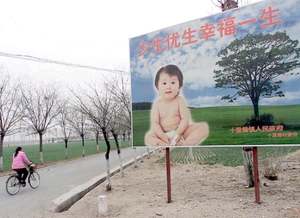
A woman cycles pass a billboard encouraging couples to have only one child, along a road leading to a village in the suburb of Beijing, 25 March 2001. (Goh Chai Hin/AFP/Getty Images)
WASHINGTON—Pregnant women lacking birth permits are hunted down like criminals by population planning police in China and forcibly aborted. The degree of monitoring and coercion of ordinary women in their reproductive lives in communist China is shocking to persons living in the free world. In a congressional hearing chaired by Rep. Chris Smith (R-N.J.4), Sept. 22, several victims of communist China’s one-child policy testified to their experiences of coercion and involuntary abortion.
“For over three decades, brothers and sisters have been illegal; a mother has absolutely no right to protect her unborn baby from state-sponsored violence,” said Rep. Smith, who in his 30-year congressional career has chaired 29 congressional human rights hearings focused in whole or in part on China’s one-child policy.
The policy was introduced in 1978, and Chinese authorities say it will remain in place until at least 2015, said Valerie Hudson, political science professor at Brigham Young University. The regime claims the policy has prevented 400 million births from 1979 to 2011.
Reggie Littlejohn, president of Women’s Rights Without Frontiers, testified to 13 new cases of coercion in a report her organization released on the day of the hearing. Littlejohn described cases of forced abortion (including one woman at eight months and another carrying twins at eight and a half months), forced sterilization, forced contraception, the use of abortion and sterilization quotas, family planning jail cells, the demolition of homes (even for missing a pregnancy check), and the use of collective punishment by demolishing homes and fining relatives of the “violators.”
State Surveillance
The close monitoring of the Family Planning Commission could be seen in the testimony of Ping Liu. In the 1980s, the practice was to have an intrauterine device (IUD) implanted after giving birth to one’s first child. But because Liu had swelling in her right kidney, the doctors did not implant the IUD; instead they said that she should use other contraceptive methods.

Congressman Chris Smith (R-N.J.) held a hearing Sept. 22 on China's one-child policy with new testimony. Congressman Smith deplored the extreme surveillance, forced abortions and sterilizations, and coercion of Chinese women of childbearing age. (Gary Feuerberg/The Epoch Times)
“Without the IUD, I became the prime target for surveillance by the factory’s Family Planning Commission,” she said. In the factory where she worked, workers monitored each other, and were suspicious and hostile to each other because of the threat of collective punishment. Two of her pregnancies were reported by her colleagues to the Family Planning Commission.
“When discovered, pregnant women would be dragged to undergo forced abortions—there simply was no other choice. We had no dignity as potential child-bearers.”
Liu said that every month during their menstrual period, women had to undress in front of the birth-planning doctor for examination. "We were allowed to collect a salary only after it was confirmed that we were not pregnant,” she said.
From 1983 to 1990, because of the one-child policy, Liu was forced to have five abortions.
Ling Chai personally testified to the situation of being pregnant and not married. She said China’s one-child policy is a “one-child per couple” policy. “It is the ‘all other children must die’ policy,” she said. The policy means most married couples will not be allowed to have more than one child and unmarried women are not allowed to have babies at all. She told how she, unmarried, became pregnant at age 18, and had no choice but to abort; in her second pregnancy she was forced to abort a second time.
In her third pregnancy, she and her boyfriend wanted to get married, but in China, that didn’t help save her child. In order to marry, the combined age of a couple must be 48.
Even if they could wed, without a birth permit, no baby was allowed, she said.
Chai’s fourth abortion shows an insidious side of the one-child policy. Chai was in Paris, and no longer faced the threat of the state’s forced abortion policy. She was married and no longer had to hide the pregnancy in shame. “Still I carried the mindset of China that abortion was the right choice if the circumstances made keeping the baby difficult,“ Chai said.